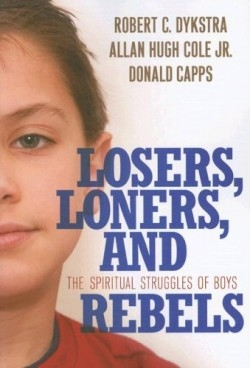Losers, Loners, and Rebels
The Spiritual Struggles of Boys
In American culture, boyhood is seen as a perpetual summer where the only things that matter are baseball games, bicycle rides, and the swimming hole.
The reality of boyhood is grimmer than most adults think. According to the book Losers, Loners, and Rebels, boyhood is a turbulent time. Authors Dykstra, Cole, and Capps assert that most boys see themselves as losers, loners, and rebels at some point in their adolescence, an identification that causes a crisis of agony and confusion. Most parents are unaware that anything is wrong with their boys. Not only do boys hide their emotions, but the men around them offer little guidance because they have blocked out their memory of this crisis.
This feeling of agony and confusion, however, is a critical step for boys because it determines their emotional and spiritual path to adulthood. The book focuses on helping adults understand how ten- to twelve-year-old boys think and how to reconnect with boyhood’s realities. Each author explores a persona through research and their own memories.
In the first section, Dykstra analyzes the word loser—how it evolved from a term in business to the current definition of failing in life. The fear of being associated with losers, Dykstra recalls, caused him to end a longtime friendship with a sickly boy. Only when the boy died did Dykstra realize what a loser was.
With the loner persona, described by Cole in the second section, boys balance the fine line of feeling isolated and alone with learning to be independent. Cole recalls realizing he was a loner when he declined a cousin’s invitation to join a Pentecostal church. Although the relationship suffered, the decision to be a loner ultimately led Cole to a religious career.
Capps defines the rebel persona as a time when boys learn self-sufficiency. He feels that humor is one way boys learn rebellion and shows it by comparing guidelines for honorable boys in the Boy Scouts of America handbook to common jokes and other stories.
The three authors are scholars (Dykstra and Capp at Princeton Theological Seminary, Cole at Austin Presbyterian Theological Seminary) and ministers who interact regularly with boys and understand their emotional struggle. Their best qualification for writing this book, however, is their ability to convey the past so well. Their research mixed with startling memories makes this book an engrossing read. While it should be required reading for any spiritual teacher or counselor, Losers, Loners, and Rebels is necessary for anyone who interacts with adolescent boys. Parents may lament that there are no step-by-step answers, but the book will help them reconnect to their youth as well as guide their own sons through the murky waters of adolescence.
Reviewed by
Katerie Prior
Disclosure: This article is not an endorsement, but a review. The publisher of this book provided free copies of the book to have their book reviewed by a professional reviewer. No fee was paid by the publisher for this review. Foreword Reviews only recommends books that we love. Foreword Magazine, Inc. is disclosing this in accordance with the Federal Trade Commission’s 16 CFR, Part 255.

